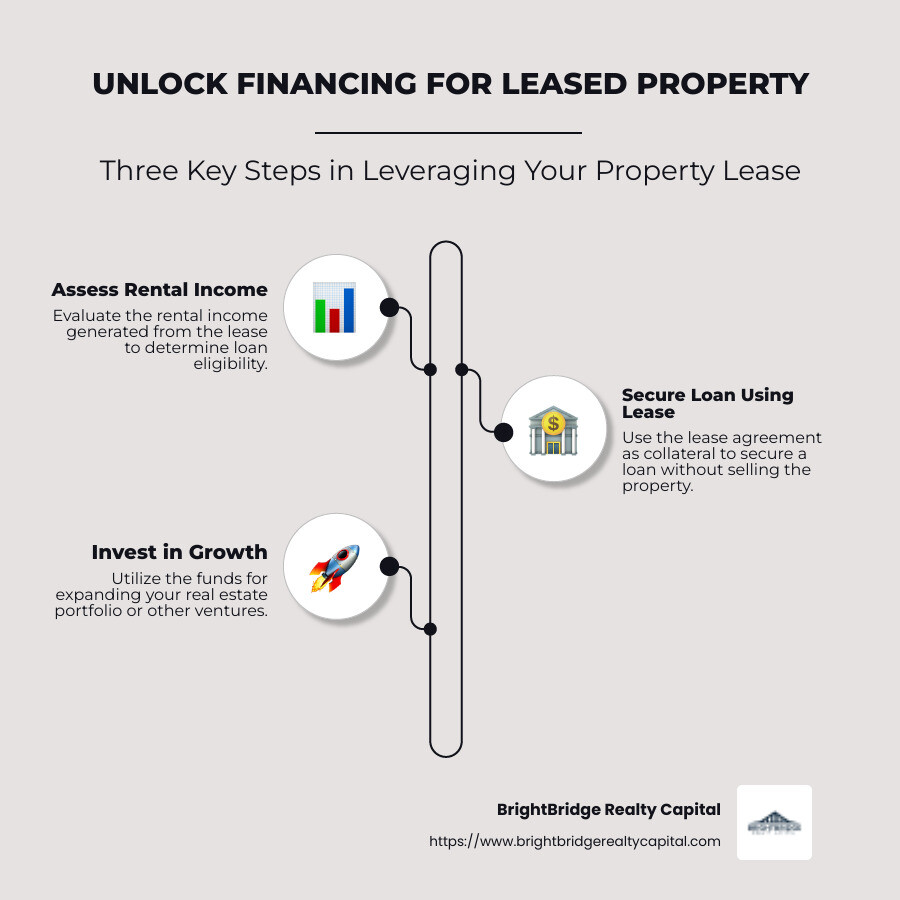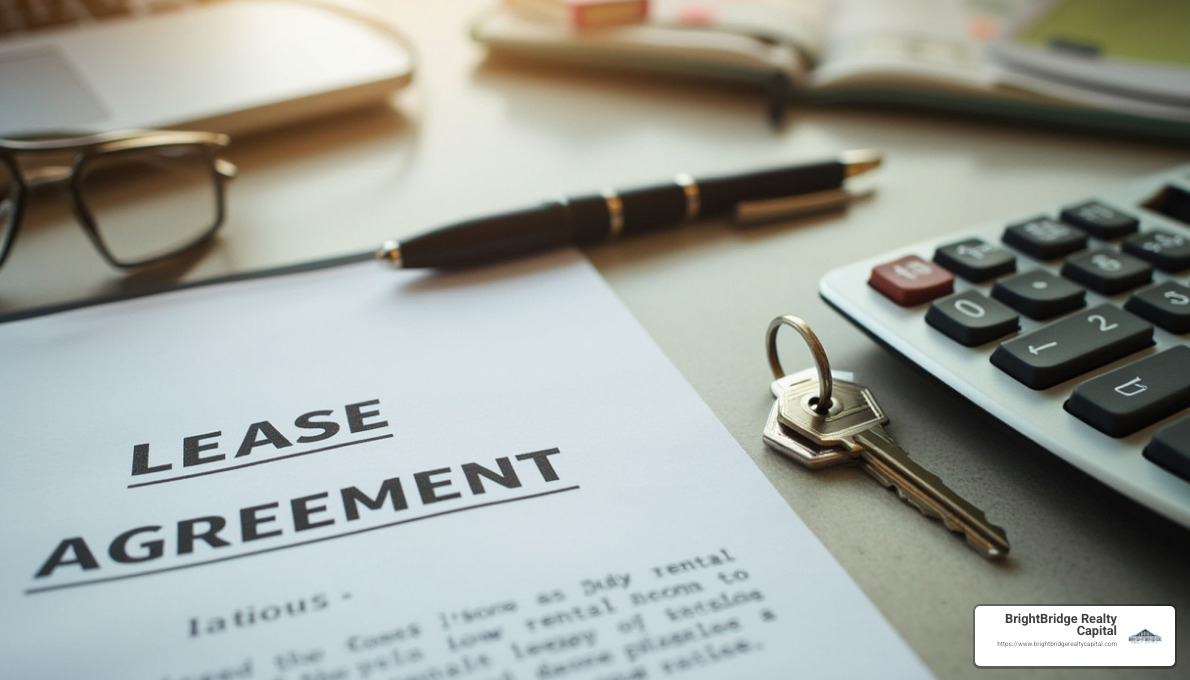Unlocking Value: How to Get a Loan Against Your Lease Property

Loan Against Lease Property is an attractive financing solution that lets real estate investors tap into the potential of their existing assets without selling them. By leveraging a lease agreement, property owners can secure a loan based on the property's rental income. This provides a flexible and efficient way to access funds for various investment needs such as expanding a rental portfolio or starting on new real estate projects.
- Open up Financing: Use your leased property to get fast and reliable funding.
- Leverage Rental Income: Your lease agreement becomes a valuable asset that can secure a loan.
- Flexible Options: Custom solutions to meet your specific investment goals.
Lease agreements are not just documents that guarantee rental payments; they can serve as a powerful tool in your investment strategy. By understanding the nuances of loans against lease property, savvy investors can harness this potential to grow their real estate ventures effectively.

Understanding Loans Against Lease Property
When it comes to open uping the value of your leased property, Lease Rental Discounting (LRD) is a game-changer. This type of loan allows property owners to use their rental income as collateral to secure financing. In simple terms, it's like turning your lease agreement into a financial asset that can help you access the funds you need.
Lease Rental Discounting Explained
With Lease Rental Discounting, the lender evaluates the rental income generated from your leased property. The lease agreement serves as proof of this income, making it a key element in securing the loan. This means that the more stable and lucrative your rental income, the better your chances of getting favorable loan terms.
Collateral: Unlike traditional loans that require physical property as collateral, LRD leverages your lease agreement. This makes it an attractive option for those who want to maintain ownership while accessing liquidity.
Rental Income: The monthly rent you receive plays a crucial role. Lenders assess this income stream to determine the loan amount and interest rate. A steady and high rental income can lead to better loan conditions.
Why Consider a Loan Against Lease Property?
Access to Funds: Need to expand your property portfolio or invest in new projects? An LRD can provide the necessary capital without selling your asset.
Lower Interest Rates: Since the loan is secured by rental income, lenders often offer competitive interest rates compared to unsecured loans.
Flexible Repayment Terms: Depending on your rental income and lease agreement, you can negotiate repayment terms that fit your financial situation.

Case Study: A Real-World Example
Consider a commercial property owner who leases out office spaces. By using the lease agreements as collateral, they secure a loan to renovate and expand their building. This not only increases rental income but also boosts property value. The result? A win-win situation where the owner improves their investment without selling the property.
Understanding how to leverage loans against lease property can provide you with the financial flexibility needed to seize new opportunities in the real estate market. Whether you're a seasoned investor or just starting out, this financing option can be a valuable tool in your investment strategy.
Types of Loans for Leased Properties
When you're looking to open up the value of your leased property, understanding the different types of loans available is crucial. Let's explore three popular options: Lease Rental Discounting, Commercial Property Loans, and Mortgage Loans.
Lease Rental Discounting (LRD)
Lease Rental Discounting is a unique financial product that allows property owners to secure loans using their rental income as collateral. Here's how it works:
Income as Collateral: Instead of using the physical property, the lease agreement itself is the asset. This is ideal for commercial property owners who lease out office spaces, retail outlets, or industrial buildings.
Loan Amount: The loan amount is determined based on future expected rentals. This means the more stable and higher your rental income, the better the loan terms you can negotiate.
Use Cases: LRD is particularly beneficial for business expansion, asset purchase, or loan repayment. With the tenant directly paying the bank through an escrow account, it provides a streamlined way to manage loan repayments.
Commercial Property Loans
For those who own commercial spaces, Commercial Property Loans are another viable option. These loans are custom specifically for properties leased to tenants and offer several advantages:
Lease as Leverage: The income from the lease can help secure better terms, making it a practical choice for business owners looking to expand or improve their spaces.
Flexible Terms: Depending on the lease agreement and the property's market value, you can negotiate terms that align with your business goals.
Long-Term Financing: These loans typically offer longer repayment terms, which can be advantageous for large-scale commercial investments.
Mortgage Loans on Leased Residential Property
Even residential properties that are leased out can be leveraged for loans. Here's what you need to know:
Market Value and Rental Income: Lenders assess both the property's market value and the rental income before determining the loan amount. This dual assessment ensures that the loan is backed by both tangible and income-generating assets.
Shorter Tenure: Residential lease agreements often have a shorter tenure than commercial ones, so the loan conditions may differ accordingly.
Owner's Advantage: This type of loan is perfect for property owners who want to maintain ownership while accessing funds for personal needs or further investments.
Understanding these loan types helps you make informed decisions about how to leverage your leased property for financial growth. Whether you're expanding your business or investing in new ventures, choosing the right loan can be a pivotal step in your real estate journey.
Eligibility Criteria for Loans Against Lease Property
Before you can secure a loan against lease property, there are specific eligibility criteria you must meet. These criteria ensure that both you and the lender are on solid ground.
Property Ownership
First and foremost, you need to be the legal owner of the leased property. This means having all necessary ownership documents ready to present to the lender. Without clear ownership, getting a loan is next to impossible.
Creditworthiness
Your credit score is a big deal. Lenders want to see that you have a good track record of paying your debts. A strong credit history shows that you can handle the responsibility of repaying a loan. If your credit score is lacking, it might be time to work on improving it before applying.
Tenant Reliability
Lenders are not just interested in you; they're also interested in your tenants. A reliable tenant with a good payment history increases your chances of loan approval. Lenders prefer long-term tenants who pay on time because it means stable rental income for you, which in turn, assures them of your ability to repay the loan.

Additional Considerations
Rental Income: A steady and reliable rental income is crucial. Lenders will evaluate the income generated from the property's lease agreement. A stable income stream increases your chances of securing a favorable loan.
Lease Agreement Validity: The lease agreement must be legally binding and have a reasonable remaining tenure. Longer lease terms with reliable tenants are often preferred by lenders.
Property Valuation: The property's market value will be assessed. Generally, the loan amount is a percentage of this value, which varies depending on whether the property is residential or commercial.
Meeting these criteria doesn't just increase your chances of getting a loan; it also helps you negotiate better terms. When you're well-prepared, you can open up the full potential of your leased property.
Advantages and Challenges of Loans Against Lease Property
When considering a loan against lease property, it's important to weigh both the benefits and the potential problems you might face. Let's explore the key aspects: access to funds, lower interest rates, and tenant risk.
Access to Funds
One of the biggest perks of a loan against lease property is the ability to access funds without having to sell your asset. This means you can continue to enjoy rental income while obtaining the financial support you need. Whether it's for business expansion, asset purchase, or loan repayment, this type of loan provides a valuable financial cushion. The loan is typically based on the rental receipts of the property, which means you can leverage your existing lease agreements to secure funding.
Lower Interest Rates
Since these loans are secured by the property itself, they often come with lower interest rates compared to unsecured loans. This makes them an attractive option for property owners looking to minimize their borrowing costs. Lower interest rates mean more manageable monthly payments and less financial strain over the life of the loan.
Tenant Risk
However, securing a loan against lease property isn't without its challenges. One of the primary concerns for lenders is tenant risk. If your tenant has a history of late payments or defaults, it could negatively impact your loan approval process. Lenders prefer properties with long-term, reliable tenants who have a consistent payment history. This reliability assures lenders of a stable income stream, which is crucial for the repayment of the loan.
Another challenge arises if the lease agreement is short-term. Lenders might hesitate to offer a loan if the income from the lease isn't guaranteed for the long term. It's important to ensure that your lease agreements are legally binding and have a reasonable remaining tenure to increase your chances of loan approval.
In summary, while a loan against lease property offers significant advantages such as easy access to funds and lower interest rates, be aware of the tenant-related risks that could affect your loan application. Being well-prepared and understanding these dynamics can help you make the most of your leased property's potential.
Frequently Asked Questions about Loans Against Lease Property
Can you get a loan against a leased residential property?
Yes, you can get a loan against a leased residential property. This is a great option if you're looking to access funds without selling your property. Lenders will consider the rental income and the lease agreement as collateral. However, the process may vary depending on the property's market value and the lease's terms. Residential leases typically have shorter tenures than commercial ones, so the loan conditions might differ. It's essential to have a solid lease agreement and a reliable tenant to improve your chances of approval.
What are the tax benefits of a loan against lease property?
There can be several tax benefits when you take a loan against lease property. One of the main advantages is that the interest paid on the loan may be tax-deductible, depending on your local tax laws and how you use the funds. For instance, if you use the loan for business purposes, you might be able to deduct the interest as a business expense. Always consult with a tax advisor to understand the specific tax implications and benefits in your situation.
How does tenant reliability affect loan approval?
Tenant reliability is crucial when applying for a loan against lease property. Lenders prefer properties with tenants who have a history of on-time payments and long-term leases. A stable income stream from a reliable tenant assures lenders that you will have the necessary funds to repay the loan. If your tenant has a high turnover rate or a history of late payments, it could be a red flag for lenders. Ensuring that your tenant is dependable can significantly improve your chances of securing a loan.
Conclusion
At BrightBridge Realty Capital, we understand that accessing funds quickly and efficiently can make all the difference in your real estate investment journey. Our expertise in real estate financing allows us to offer custom solutions that meet your specific needs, whether you're looking to expand your portfolio or manage existing properties.
One of our standout offerings is our ability to provide quick funding. We know that timing is crucial in real estate, and our fast closing process ensures you can seize opportunities as they arise. With our direct lending approach, we cut out the middleman, providing competitive rates and a seamless experience.
If you're considering a loan against lease property, BrightBridge Realty Capital is here to guide you every step of the way. Our team is dedicated to helping you open up the value of your leased properties, offering solutions that align with your investment goals.
Ready to explore your options? Learn more about our services and find how we can help you achieve your real estate ambitions.


